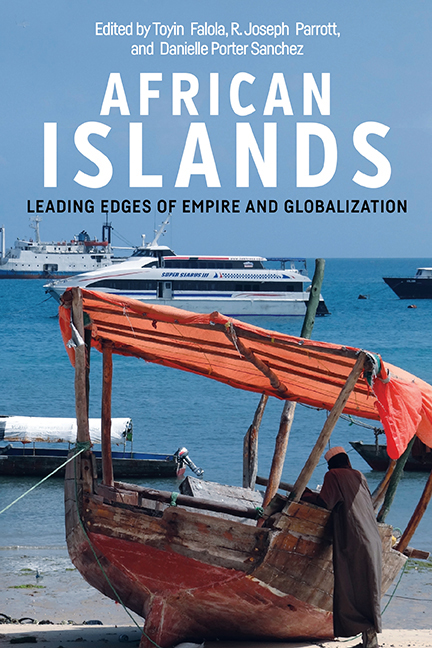Book contents
- Frontmatter
- Dedication
- Contents
- Introduction: Arbiters and Witnesses of Change: Contextualizing Conversations on African Islands
- Part 1 Atlantic Ocean Islands
- 1 The Canaries to Africa: The Atlantic Strategy of “To Be or Not to Be”
- 2 Sugar, Cocoa, and Oil: Economic Success and Failure in São Tomé and Príncipe from the Sixteenth to the Twenty-First Centuries
- 3 The Bijagos of Canhabac Island (Guinea-Bissau)
- 4 An Island in the Middle of Everywhere: Bioko under Colonial Domination
- 5 Cursing in Bioko and Annobón: Repeating Islands that Don't Repeat
- 6 African Ports and Islands during the Second World War
- 7 “Nos lingua, nos kultura, nos identidadi”: Postcolonial Language Planning and Promotion in Cabo Verde and the Cape Verdean Diaspora
- Part 2 Indian Ocean Islands
- Notes on Contributors
- Index
1 - The Canaries to Africa: The Atlantic Strategy of “To Be or Not to Be”
from Part 1 - Atlantic Ocean Islands
Published online by Cambridge University Press: 31 August 2019
- Frontmatter
- Dedication
- Contents
- Introduction: Arbiters and Witnesses of Change: Contextualizing Conversations on African Islands
- Part 1 Atlantic Ocean Islands
- 1 The Canaries to Africa: The Atlantic Strategy of “To Be or Not to Be”
- 2 Sugar, Cocoa, and Oil: Economic Success and Failure in São Tomé and Príncipe from the Sixteenth to the Twenty-First Centuries
- 3 The Bijagos of Canhabac Island (Guinea-Bissau)
- 4 An Island in the Middle of Everywhere: Bioko under Colonial Domination
- 5 Cursing in Bioko and Annobón: Repeating Islands that Don't Repeat
- 6 African Ports and Islands during the Second World War
- 7 “Nos lingua, nos kultura, nos identidadi”: Postcolonial Language Planning and Promotion in Cabo Verde and the Cape Verdean Diaspora
- Part 2 Indian Ocean Islands
- Notes on Contributors
- Index
Summary
While the Canaries undoubtedly belong geographically to the African continent, and although their first settlers came from Africa, inhabitants have not always accepted this connection. From the Castilian conquest onward, the islands formed an eminently Atlantic territory that served as a bridge between Europe, America, and Africa. The intensity and consistency of relations with the latter continent were quite strong throughout the centuries. However, as a colonized territory, its capacity for decisions was limited and depended on the choices made outside of the archipelago, including conversations about relations with Africa.
The Canaries was always a territory that stood out in its relation with Africa and Africans, both north and south of the Sahara. In comparison with the rest of Spain, its linkages with the continent of Africa have been undoubtedly the most regular. Various causes explain this fact. First, it is necessary to highlight the geographical position of the Canaries. The archipelago is situated on the African tectonic plate, only about sixty miles from the continent, while it is 680 miles from the closest point of Europe. Due to its political allegiance, the Canaries forms part of the European Union, which recognizes its ultraperipheral character; that is to say, it lies beyond the traditional frontiers of Europe itself.
In contrast, throughout its history, Canarian culture has reflected its tricontinental nature, mixing African, European, and American influences in different proportions depending on the historical moment under consideration. Because of its role as an intersection of routes, the Canaries developed as a crossing place obligatory for Spanish interests in Africa in addition to those of other European authorities and, more recently since the beginning of the twentieth century, world powers. The Canaries works as a gateway that opens in various directions, one that is permeable for comings and goings. Moreover, due to its special historical development, the regularity of contacts has been constant to the point where the development of life on the islands cannot be understood without this bond.
Along with the geographical position, there are other conditioning factors that limited the connections with the African continent. One of these is the development of the Canarian productive forces themselves and the productive model developed at each historic economic cycle.
- Type
- Chapter
- Information
- African IslandsLeading Edges of Empire and Globalization, pp. 39 - 67Publisher: Boydell & BrewerPrint publication year: 2019



